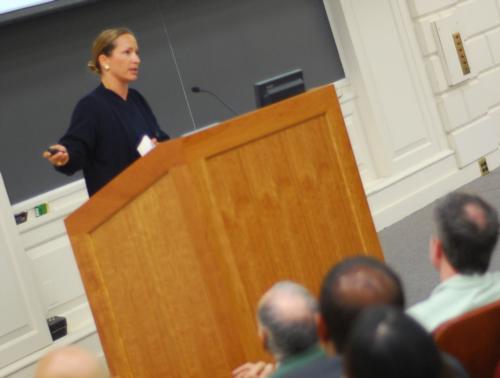
News
Summers Will Not Finish Semester of Teaching as Harvard Investigates Epstein Ties

News
Harvard College Students Report Favoring Divestment from Israel in HUA Survey

News
‘He Should Resign’: Harvard Undergrads Take Hard Line Against Summers Over Epstein Scandal

News
Harvard To Launch New Investigation Into Epstein’s Ties to Summers, Other University Affiliates

News
Harvard Students To Vote on Divestment From Israel in Inaugural HUA Election Survey
Princess Addresses Education

Princess Zahra Aga Khan ’94 said Tuesday evening that her audiences typically expect her to be sporting a hajib, as well a “long frilly dress and tiara.”
But Khan—speaking at the Graduate School of Education about teaching and learning in the developing world—came dressed in a dark suit instead.
Khan, director of the Social Welfare Department at the Aga Khan Development Network (AKDN), is the eldest child of The Aga Khan ’59, the current Imam of the Shia Ismaili Muslims. AKDN, founded by The Aga Khan, promotes social and economic development of societies in various regions of Africa and Asia, “focusing on the needs of the poor and ultra-poor,” according to Professor Ali S. A. Asani ’77, who studies Indo-Muslim cultures.
While Princess Khan’s responsibilities at AKDN also include coordinating health and building services programs, her talk focused specifically on AKDN’s experience in operating more than 300 schools throughout Africa and Asia.
She spoke about several case studies to provide insight into education in the developing world—including the East African nations of Kenya, Uganda, and Tanzania, as well as Pakistan, India, and the Central Asian countries of Tajikistan, Kyrgyzstan, and Kazakhstan.
According to Khan, post-colonial East Africa often promoted “not education for education’s sake, but for, shall we say, indoctrination and to build nationalism.”
“It is tempting for many people to think that government could provide all the answers,” Khan said, referring to the process of nationalized education in East Africa.
“The urge for mass education...is at once a fantastic thing, but there is a very high risk for a loss of quality,” she added.
In Pakistan, AKDN originally focused on educating women in traditional areas. But not only was the economy in those areas not developed enough to utilize this labor force, but social tension resulted from the marrying of men to more educated women, Khan said.
This experience led the organization to open schools for boys, she said.
Khan also said that India’s rural, isolated communities demonstrated the need to “be sensitive” of the “tension between education for global citizenship and being true to their cultures,” while post-Soviet Central Asian countries showed the importance of providing “relevant education,” including a “large component of technical and vocational education.”
Amyn Pesnani, a student at Harvard Business School, said that Khan “pointed out to me the importance of thinking ahead of any short-term social dislocations that might occur when providing long-term social benefits,” such as education.
Audience member Harris Sussman, who runs the M.N. Adamov Memorial Fund to assist blind people in Russia, said he admired AKDN’s ability to offer such a “wide scope of activities” while still “respecting and operating within these cultures.”
—Staff writer Peter Zhu can be reached pzhu@fas.harvard.edu.
Want to keep up with breaking news? Subscribe to our email newsletter.
